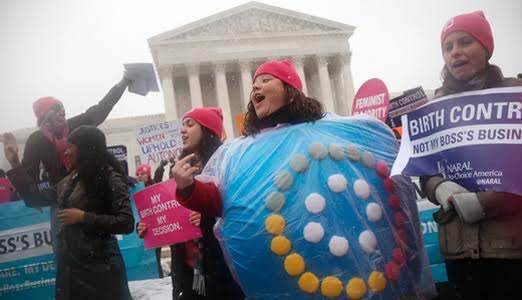
WASHINGTON — The latest religious-based challenge to the Affordable Care Act’s contraceptive care for working women hit the U.S. Supreme Court on March 23, this time from non-profit institutions, rather than companies.
Two years ago, despite the ACA’s mandate that health insurance cover comprehensive preventive care, the court in the Hobby Lobby case https://www.peoplesworld.org/supreme-court-allows-corporations-to-deny-birth-control-coverage/ ruled the Religious Freedom Restoration Act (RFRA) lets for-profit businesses deny women workers contraceptive coverage, if using those contraceptives contradicts the business owners’ personal religious beliefs.
Hobby Lobby dealt with for-profit businesses. But ACA regulations already have a loophole for religiously affiliated non-profits, like universities and social-service agencies.
A non-profit with a religious objection to insurance coverage for contraceptives need only file a form stating its objection and identifying its health insurer or third-party administrator (TPA). The federal government then makes an independent arrangement with the insurance company or TPA to provide women workers with contraceptive care.
The insurer or TPA must use separate funds and provide the worker with separate notices, and cannot charge the employer a penny. Meanwhile, women workers get contraceptive care from the same health-care provider, under the same insurance plan, as they receive all other health care. In this way the ACA regulations balance religious liberty with working women’s constitutional right to use contraceptives.
But in Zubik v. Burwell and six related cases, a group of religiously affiliated nonprofits claim this ACA accommodation violates RFRA. They insist RFRA requires they get the same blanket exemption from the contraceptive mandate that the regulations give houses of worship. https://www.peoplesworld.org/scotus-takes-on-little-sisters-of-the-poor-challenge-to-obamacare/
A win for these nonprofits would force their women workers to search and pay for alternative contraceptive coverage, probably from different insurance companies covering doctors different from those M.D.s these workers see for all other medical conditions.
Under RFRA, Congress cannot “substantially burden a person’s exercise of religion” unless imposing that burden furthers a “compelling government interest” by the “least restrictive means.” The Zubik non-profits argue that specifying their insurance company or TPA, and thereby triggering the independent government arrangement to provide their workers with contraceptives, makes them “collaborators” in sinful behavior.
Arguing first on March 23, Paul Clement, speaking for the Zubik non-profits, claimed that, because of the large penalty for noncompliance, the regulations impose a “substantial burden” on his clients’ sincere religious beliefs. The regulations don’t further a “compelling” interest, he continued. The government already exempts houses of worship, small businesses, and preexisting insurance plans. And because the government could provide contraceptives without “hijacking” the nonprofits’ health-insurance plans-for example, by providing free contraception-only plans on federal health-care exchanges-Clement and attorney Noel Francisco agreed with Justice Samuel Alito’s suggestion that the government has alternatives that don’t burden religion.
Representing the federal government, Obama Administration Solicitor General Donald Verrilli conceded the non-profits sincerely believe that following ACA regulations would make them “complicit” in a “moral wrong.” His concession prompted Justice Anthony Kennedy to declare a “substantial burden” under RFRA.
But, as Justice Sonia Sotomayor noted, by that reasoning any purported burden on religion would automatically be “substantial.”
It can’t qualify as a “substantial burden,” she suggested, when someone just objects to the government’s regulating “third parties,” like the insurance companies here. If it does, she continued, “How will we ever have a government that functions?” Added Justice Stephen Breyer, to live in a pluralist society, religious people must often tolerate “burdens that they are going to find totally obnoxious.”
Verrilli went on to argue the importance of providing workers with contraceptive services “as part of their regular care from their regular doctor.” Chief Justice John Roberts retorted this analysis makes the government interest not just providing contraceptives, but providing them “seamlessly,” through the same insurance plan or TPA hired by the employers.
For Roberts, forcing workers to find another source of contraceptive coverage would present a mere “administrative burden,” just “a question of who does the paperwork,” balanced against the employers’ “basic principle of faith.” Verrilli objected that, far from just a matter of “paperwork,” forcing women workers to search and pay for alternative coverage would not equally further the government’s interest in assuring preventive care for women workers.
Verrilli did not press a point made in the some of the briefs: Employers who contest the contraceptive mandate object only to health-care options for women. An employer’s selective objection to health-care coverage for sickle-cell anemia-an ailment that disproportionately affects African-Americans-would look like discrimination based on race.
Preventing racial or sexual discrimination constitutes a “compelling interest” under RFRA. But the government can only prevent discrimination by requiring equal treatment.
Forcing women, but not men, to seek basic aspects of their health care outside their regular health-insurance plan perpetuates discrimination. Picking up on this argument, Justice Ruth Bader Ginsburg wondered how, if the regulation falls, women students and workers could get “what all the other students [and workers] get for all other health protection.”
Justice Anthony Kennedy’s views could determine the outcome. If Kennedy votes to overturn the challenged ACA regulation, the eight-member court will probably deadlock. Seven federal courts of appeals have upheld the regulation. One has struck it down. If the court deadlocks, women workers’ ACA rights will depend on where they live.
Zubik is the fourth challenge to the ACA to reach the Supreme Court. More legal challenges are on their way. A decision in Zubik is expected in late June.
David Sobelsohn is the PAI Supreme Court correspondent
Photo: Woman wears a birth control pills costume as she joins protests in front of the Supreme Court in Washington, March 25, 2014. The court heard oral arguments in the challenges to President Barack Obama’s health care law requirement that businesses provide their female employees with health insurance that includes access to contraceptives. | Charles Dharapak | AP












Comments